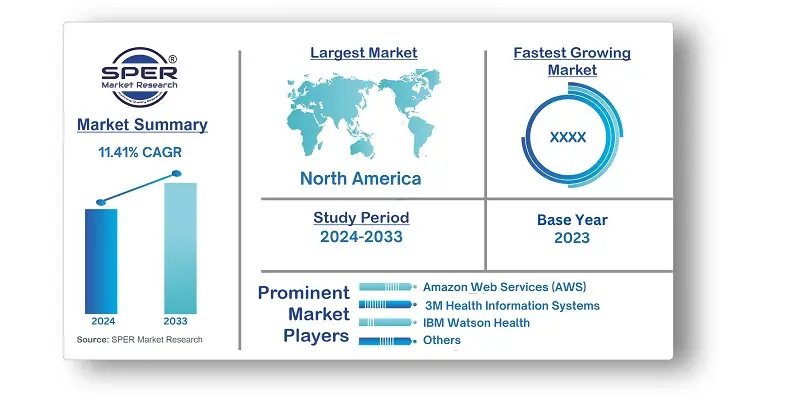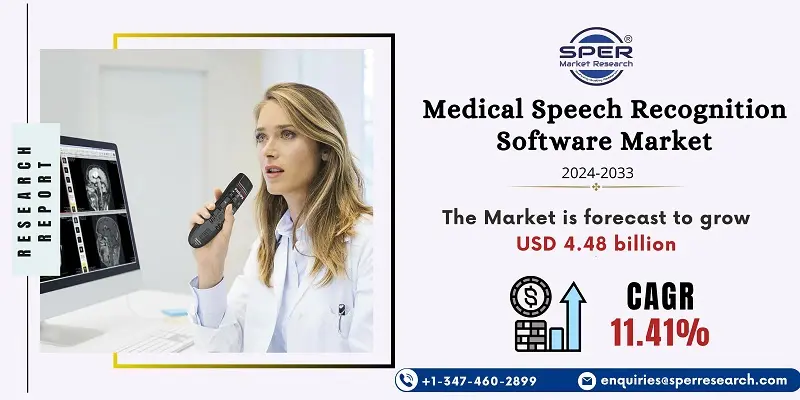
Medical Speech Recognition Software Market Trends, Share, Demand, Revenue and Future Outlook
Medical Speech Recognition Software Market Growth, Size, Trends Analysis- By Deployment, By Functionality, By End User- Regional Outlook, Competitive Strategies and Segment Forecast to 2033
| Published: Dec-2024 | Report ID: HLCA24108 | Pages: 1 - 249 | Formats*: |
| Category : Healthcare | |||
- Microsoft subsidiary Nuance Communications revealed in August 2024 that Northwestern Medicine had selected Dragon Ambient eXperience Copilot, which is integrated with Epic, as its ambient voice solution. Northwestern Medicine doctors can use DAX Copilot, which is powered by Microsoft Cloud for Healthcare, to turn patient talks into a productive tool that improves patient experiences and lessens paperwork obligations.
- Dolbey and Company, Inc. and SOAP Health, a leading pioneer in AI-powered medical procedures, formed a strategic alliance in August 2023. This collaboration combines Dolbey's state-of-the-art voice recognition technology, Fusion Narrate powered by nVoq, with SOAP Health's AI expertise in medical engagements. By improving efficiency, income, early disease detection, diagnosis, and overall patient outcomes, the alliance seeks to revolutionize relationships between medical personnel and patients.


| Report Metric | Details |
| Market size available for years | 2020-2033 |
| Base year considered | 2023 |
| Forecast period | 2024-2033 |
| Segments covered | By Deployment, By Functionality, By End User |
| Regions covered | North America, Asia-Pacific, Latin America, Middle East & Africa and Europe |
| Companies Covered | Nuance Communications, Inc; Amazon Web Services (AWS); 3M Health Information Systems; IBM Watson Health; Microsoft Corporation; DeepScribe; Augnito; Deepgram; ScienceSoft; PrognoCIS. |
- Hospitals and Clinics
- Specialty Centers (e.g., Radiology Centers)
- Primary Care Centers
- Telemedicine Providers
- Doctors and Physicians
- Healthcare IT Managers and Administrators
- System Integrators
- Medical Transcription Service Providers
- Pharmaceutical and Research Organizations
- EHR/EMR Solution Providers
- Regulatory Bodies
- Educational and Training Institutes
| By Deployment: | |
| By Functionality: | |
| By End User: |
- Global Medical Speech Recognition Software Market Size (FY’2024-FY’2033)
- Overview of Global Medical Speech Recognition Software Market
- Segmentation of Global Medical Speech Recognition Software Market By Deployment (Cloud-based, On-premises)
- Segmentation of Global Medical Speech Recognition Software Market By Functionality (Front-end Speech Recognition, Back-end Speech Recognition, Voice Command and Control)
- Segmentation of Global Medical Speech Recognition Software Market By End Use (Doctors & Physicians, Radiologists, Medical Transcriptionist)
- Statistical Snap of Global Medical Speech Recognition Software Market
- Expansion Analysis of Global Medical Speech Recognition Software Market
- Problems and Obstacles in Global Medical Speech Recognition Software Market
- Competitive Landscape in the Global Medical Speech Recognition Software Market
- Impact of COVID-19 and Demonetization on Global Medical Speech Recognition Software Market
- Details on Current Investment in Global Medical Speech Recognition Software Market
- Competitive Analysis of Global Medical Speech Recognition Software Market
- Prominent Players in the Global Medical Speech Recognition Software Market
- SWOT Analysis of Global Medical Speech Recognition Software Market
- Global Medical Speech Recognition Software Market Future Outlook and Projections (FY’2024-FY’2033)
- Recommendations from Analyst
1.1. Scope of the report1.2. Market segment analysis
2.1. Research data source2.1.1. Secondary Data2.1.2. Primary Data2.1.3. SPER’s internal database2.1.4. Premium insight from KOL’s2.2. Market size estimation2.2.1. Top-down and Bottom-up approach2.3. Data triangulation
4.1. Driver, Restraint, Opportunity and Challenges analysis4.1.1. Drivers4.1.2. Restraints4.1.3. Opportunities4.1.4. Challenges4.2. COVID-19 Impacts of the Global Medical Speech Recognition Software Market.
5.1. SWOT Analysis5.1.1. Strengths5.1.2. Weaknesses5.1.3. Opportunities5.1.4. Threats5.2. PESTEL Analysis5.2.1. Political Landscape5.2.2. Economic Landscape5.2.3. Social Landscape5.2.4. Technological Landscape5.2.5. Environmental Landscape5.2.6. Legal Landscape5.3. PORTER’s Five Forces5.3.1. Bargaining power of suppliers5.3.2. Bargaining power of buyers5.3.3. Threat of Substitute5.3.4. Threat of new entrant5.3.5. Competitive rivalry5.4. Heat Map Analysis
6.1. Global Medical Speech Recognition Software Market Manufacturing Base Distribution, Sales Area, Product Type6.2. Mergers & Acquisitions, Partnerships, Product Launch, and Collaboration in Global Medical Speech Recognition Software Market
7.1. Global Medical Speech Recognition Software Market Size, Share and Forecast, By Deployment, 2020-20267.2. Global Medical Speech Recognition Software Market Size, Share and Forecast, By Deployment, 2027-20337.3. Cloud-based7.4. On-premises
8.1. Global Medical Speech Recognition Software Market Size, Share and Forecast, By Functionality, 2020-20268.2. Global Medical Speech Recognition Software Market Size, Share and Forecast, By Functionality, 2027-20338.3. Front-end Speech Recognition8.4. Back-end Speech Recognition8.5. Voice Command and Control
9.1. Global Medical Speech Recognition Software Market Size, Share and Forecast, By End Use, 2020-20269.2. Global Medical Speech Recognition Software Market Size, Share and Forecast, By End Use, 2027-20339.3. Doctors & Physicians9.4. Radiologists9.5. Medical Transcriptionist9.6. Others
10.1. Global Medical Speech Recognition Software Market Size and Market Share
11.1. Global Medical Speech Recognition Software Market Size and Market Share By Region (2020-2026)11.2. Global Medical Speech Recognition Software Market Size and Market Share By Region (2027-2033)11.3. Asia-Pacific11.3.1. Australia11.3.2. China11.3.3. India11.3.4. Japan11.3.5. South Korea11.3.6. Rest of Asia-Pacific11.4. Europe11.4.1. France11.4.2. Germany11.4.3. Italy11.4.4. Spain11.4.5. United Kingdom11.4.6. Rest of Europe11.5. Middle East and Africa11.5.1. Kingdom of Saudi Arabia11.5.2. United Arab Emirates11.5.3. Qatar11.5.4. South Africa11.5.5. Egypt11.5.6. Morocco11.5.7. Nigeria11.5.8. Rest of Middle-East and Africa11.6. North America11.6.1. Canada11.6.2. Mexico11.6.3. United States11.7. Latin America11.7.1. Argentina11.7.2. Brazil11.7.3. Rest of Latin America
12.1. Nuance Communications, Inc12.1.1. Company details12.1.2. Financial outlook12.1.3. Product summary12.1.4. Recent developments12.2. Amazon Web Services (AWS)12.2.1. Company details12.2.2. Financial outlook12.2.3. Product summary12.2.4. Recent developments12.3. 3M Health Information Systems12.3.1. Company details12.3.2. Financial outlook12.3.3. Product summary12.3.4. Recent developments12.4. IBM Watson Health12.4.1. Company details12.4.2. Financial outlook12.4.3. Product summary12.4.4. Recent developments12.5. Microsoft Corporation12.5.1. Company details12.5.2. Financial outlook12.5.3. Product summary12.5.4. Recent developments12.6. DeepScribe12.6.1. Company details12.6.2. Financial outlook12.6.3. Product summary12.6.4. Recent developments12.7. Augnito12.7.1. Company details12.7.2. Financial outlook12.7.3. Product summary12.7.4. Recent developments12.8. Deepgram12.8.1. Company details12.8.2. Financial outlook12.8.3. Product summary12.8.4. Recent developments12.9. ScienceSoft12.9.1. Company details12.9.2. Financial outlook12.9.3. Product summary12.9.4. Recent developments12.10. PrognoCIS12.10.1. Company details12.10.2. Financial outlook12.10.3. Product summary12.10.4. Recent developments12.11. Others
SPER Market Research’s methodology uses great emphasis on primary research to ensure that the market intelligence insights are up to date, reliable and accurate. Primary interviews are done with players involved in each phase of a supply chain to analyze the market forecasting. The secondary research method is used to help you fully understand how the future markets and the spending patterns look likes.
The report is based on in-depth qualitative and quantitative analysis of the Product Market. The quantitative analysis involves the application of various projection and sampling techniques. The qualitative analysis involves primary interviews, surveys, and vendor briefings. The data gathered as a result of these processes are validated through experts opinion. Our research methodology entails an ideal mixture of primary and secondary initiatives.



Frequently Asked Questions About This Report
PLACE AN ORDER
Year End Discount
Sample Report
Pre-Purchase Inquiry
NEED CUSTOMIZATION?
Request CustomizationCALL OR EMAIL US
100% Secure Payment






Related Reports
Our Global Clients
Our data-driven insights have influenced the strategy of 200+ reputed companies across the globe.




















